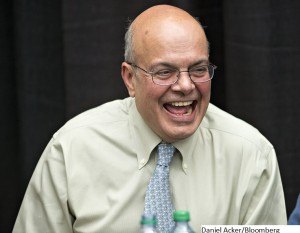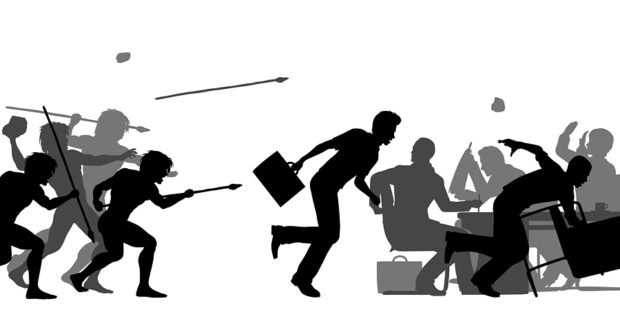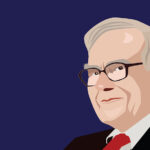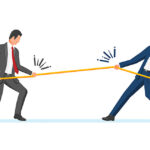Shareholders attending Berkshire Hathaway’s annual meeting on Saturday had questions about what will happen to the conglomerate when Chairman Warren Buffett is no longer around to lead it. They also wanted to know how external problems of the world would impact the future of Berkshire Hathaway.
Recalling Buffett’s past comments that “one clear, present and enduring danger to Berkshire” is a nuclear attack, one shareholder asked for some specifics on what the fallout would be for Berkshire.
Buffett and Vice Chair Ajit Jain both explained that Berkshire doesn’t accept nuclear risk as a covered insurance risk, with Buffett addressing larger unasked questions about the nature of nuclear risk itself.
“The world is flipping a coin every day as to whether people who can literally destroy the planet as we know it will do it,” he said at one point.
Investors looking for the kind of comfort they got from the nonagenarian in the early days of COVID in 2020, when he spoke about how America had faced tough times before and prevailed, didn’t hear similar messages on the prospect of nuclear war. After reviewing the accidents of history that brought scientists with knowledge of atomic weapons to America in the 1930s, and misinterpreted signals that have brought nations close to using nuclear attacks in the past, Buffett said, “There are going to be more accidents in connection with atomic weapons.”
“We can’t do anything about it. And that is one risk that Berkshire absolutely has no interest in, even though you can say everybody in the world should have an interest in it. But it doesn’t do us any good…That doesn’t stop the fact that there are two powers in the world that through true miscalculation of the others’ intentions, through all kinds of things, have come close in the past,” he said, referring to the fact that he and Vice Chair Charlie Munger lived through the Cuban missile crisis.
“There’s a lot more bad that can happen. Humanity has not really come up with a counterforce to technology…Back in the caveman ages, if you were a sociopath or something, and you threw a rock at the guy in the next cave, [the counterattack] was proportional. [But] we kept developing, and there was this breakthrough where technology has totally outrun humanity.”
Jain commented more specifically on the insurance exposure question, saying that the aspect of the nuclear situation that most concerns him is a “lack of ability to really estimate what our real exposure is in the event of a nuclear attack.”

“When it comes to a nuclear thing, I sort of surrender. It’s very difficult for us to estimate how bad ‘bad’ can be.”
Ajit Jain, Berkshire Hathaway
Bloomberg photo: Daniel Acker
“When you’re talking about other big exposures we have—earthquake and hurricane and cyber—I can with some reasonable degree of accuracy, I have a point of view in terms of how large our exposures can be and how big our loss can be. When it comes to a nuclear thing, I sort of surrender. It’s very difficult for us to estimate how bad ‘bad’ can be.”
“How many different lines of exposures will be affected by it?”
He noted that almost all of Berkshire’s contracts “try to exclude nuclear as a covered peril,” but added that even with exclusions present, if something like a nuclear event were to happen, “I’m fairly positive that the regulators and the courts will hold it against the insurers.” In other words, “they will rewrite the contracts and we will be required to pay,” Jain said.
He said there are already discussions going on about the exclusion of nuclear as a covered peril in fire policies. “There are several regulators who feel that, ‘Gee, if it’s a fire policy and if the nuclear attack causes a fire, then how can we exclude fire?'”
“Debates like that we will have to live with, and it will be very difficult for the insurance industry to fight back [against] both the regulators and the court systems in terms of what is covered and what is not covered,” Jain stated.
Buffett interjected at that point. “And there won’t be any regulators or anybody else. So, we’ll leave it to a million years of reconstruction,” he said, going on to quote the idea that World War IV will be fought with sticks and stones, attributed by Buffett and others to Albert Einstein.
“If you’re worried about the effect of nuclear attacks, you’ve got other things to worry about than the value of Berkshire, I’ll put it that way,” Buffett concluded in his direct response to the question.
Tribal Behavior
Beyond his talk about caveman times, Buffett later brought up a national development that concerns him: his general sense that “people are now somewhat more tribal than they have [been] for a long time.”
He suggested that the development today has moved well beyond usual partisanship.
“I speak from experience because I’ve been tribal,” he said, offering a not-so-serious confession about his allegiance to Nebraska football to make a point. “When I watch a television set and I see one of our guys from Nebraska step out of bounds by a foot, but somehow the ref misses it and calls it in, and then they show six replays, I’ll continue to believe it was in even though it’s right in front of my eyes that he stepped out.”
That form of tribal behavior is fun. “But it can get very dangerous,” he said, reporting from memory that the last time he has seen the country divided to the extent it is today was when he was a kid. “Either you hated [Franklin] Roosevelt or you loved him.” And if you hated him, you didn’t care who was running against him. People “just had these feelings. They either had Roosevelt’s picture on the wall and named their kids after Roosevelt, or they hated him” and swore there would be “no third term.”
“The country was very, very tribal in the ’30s, but Roosevelt’s tribe was bigger. In my opinion, they did some wonderful things, but I happened to grow up in a household where we didn’t get served dessert until we said something nasty about Roosevelt,” he reported. “So, you train them young.”
“I’ve seen a period [when] it wasn’t that way,” he said referring to presidential elections in the late 1950s. “They had partisan behavior,” but the divisions weren’t as serious.
“I don’t think it’s a good development for society generally when people get tribal,” he concluded.





















 Machine Learning for Mutuals: What’s Working, What’s Not, and What’s Next
Machine Learning for Mutuals: What’s Working, What’s Not, and What’s Next  AI Got Beat by Traditional Models in Forecasting NYC’s Blizzard
AI Got Beat by Traditional Models in Forecasting NYC’s Blizzard  Premium Slowdown, Inflation Factors to Lead to Higher P/C Combined Ratio: AM Best
Premium Slowdown, Inflation Factors to Lead to Higher P/C Combined Ratio: AM Best  10 Do’s and Don’ts of a Smart ORSA Report
10 Do’s and Don’ts of a Smart ORSA Report 




